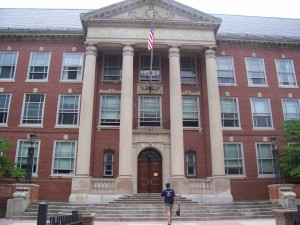submitted by jwithrow.
Journal of a Wayward Philosopher
Why the Public School System Fails
January 8, 2015
Hot Springs, VA
The S&P opened at $2,036 today. Gold is checking in at $1,212 per ounce. Oil opened just under $49 per barrel. Bitcoin is trading hands at 286 per BTC, and the 10-year Treasury rate opened at 2.00% today.
The markets have kicked off 2015 with some healthy volatility! The S&P has dipped as low as $1,985 only to bounce back up. Oil has drifted as low as $47, bringing energy stocks down with it. The 10-year rate has dipped below 2% and threatened to drift lower. Bitcoin has fallen below $300 for the first time since 2013 and gold has climbed as high as $1,221.
Last month we contemplated raising children in the modern world and we decided compulsory education was not, in our humble opinion, in the student’s best interest. We reckoned that for any real learning to occur the student would have to be free to engage a topic of their own choice and then have the space to inspect, poke, jab, nudge, kick, and maybe even dance with that topic on their own timeline. Of course this method is the exact opposite of what is employed by the compulsory public school system that says the student must learn this topic in this way on this timeline with this grading scale and he better not interact with his neighbor while doing so.
As always, it is a minority position we take on the important matters of child-rearing and education. Perhaps this is why we had such an affinity for “Don Quixote” as a youngster. While the public school system is accepted as “normal” today, it is important to understand its origin.
The current public school system model was founded in Germany in the 1800s. The Germans called their model the “gymnasium” system and it was organized in part by the German military. This system separated students by grade and limited their interaction with students of differing ages. The intent was to foster a robust bond between the boys for they would be expected to train and fight together in the military as adults. Sure enough, this system created fiercely loyal soldiers.
Meanwhile, across the Atlantic in America, students were either educated at home or in small groups that were not separated by age. Individualized education in America was less geared towards memorizing facts and figures and more geared towards fundamental reading/writing/arithmetic, common sense, and self-confidence.
Age diversity helped older students develop responsibility and leadership skills by guiding the younger students along. Younger students got the benefit of both adult tutelage and guidance from the older kids. While seemingly a small point, having two distinct perspectives on the same topic goes a long way towards fostering critical thinking. Peter Gray, in Free to Learn, discussed this very dynamic as he observed students in Sudbury Valley School.
America began moving towards the German “gymnasium” model after the Civil War with the political class using force to move the shift along. Massachusetts passed the first compulsory school attendance law in 1852 and all states had compulsory school attendance laws on the books by 1918. Reading the work of John Dewey, one of the leading educators in 20th century America, provides troubling insight into why the shift was facilitated.
“The mere absorbing of facts and truths is so exclusively individual an affair that it tends very naturally to pass into selfishness. There is no obvious social motive for the acquirement of mere learning, there is no clear social gain in success thereat.”
The political objective was the centralization and control of education in order to reduce the American spirit of individualism and make students more malleable and group-oriented. John Taylor Gatto expanded upon the political shift of American education in his books Dumbing Us Down: The Hidden Curriculum of Compulsory Schooling and The Underground History of American Education: A School Teacher’s Intimate Investigation Into the Problem of Modern Schooling.
History and political motives aside, Gatto also outlined and then expanded upon several points that demonstrate how the public school system is “dumbing us down”. They are as follows:
1. It confuses the students. It presents an incoherent ensemble of information that the child needs to memorize to stay in school. Apart from the tests and trials that programming is similar to the television, it fills almost all the “free” time of children. One sees and hears something, only to forget it again.
2. It teaches them to accept their class affiliation.
3. It makes them indifferent.
4. It makes them emotionally dependent.
5. It makes them intellectually dependent.
6. It teaches them a kind of self-confidence that requires constant confirmation by experts (provisional self-esteem).
7. It makes it clear to them that they cannot hide, because they are always supervised.
Gatto’s points refer to the public school system itself; not to the individuals working within the system. Most school employees at the local level are well-intentioned and work hard to improve the quality of their school. But they are forced to operate within the confines of the gymnasium system and they are forced to use government-approved politically-correct textbooks. More money will not change this dynamic, it will only further empower the Department of Education and impoverish the public.
So what is a concerned parent to do? Opt out!
Until the morrow,
Joe Withrow
Wayward Philosopher
For more of Joe’s thoughts on homeschooling and educational alternatives please read “The Individual is Rising” which is available at http://www.theindividualisrising.com/. The book is also available on Amazon in both paperback and Kindle editions.







